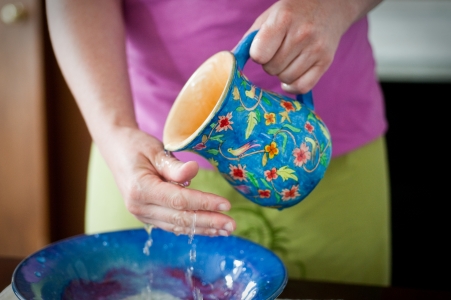The beginning of the seder seems strange. We start with kiddush as we normally would when we begin any festive meal. Then we wash, but without a blessing, and break bread without eating it.
What’s going on here?
It seems that the beginning of the seder is kind of a false start. We act as if we are going to begin the meal but then we realize that we can’t – we can’t really eat this meal until we understand it, until we tell the story of the exodus from Egypt. So we interrupt our meal preparations with maggid (telling the story). Only once we have told the story do we make kiddush again, wash our hands again (this time with a blessing) and break bread and eat it! In order to savor this meal, in order to appreciate the sweet taste of Passover, we must first understand it.
Used by permission of the author











